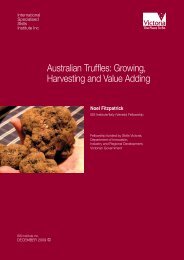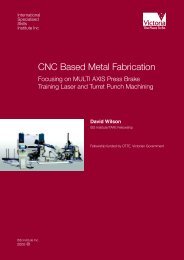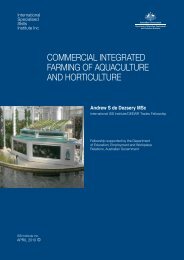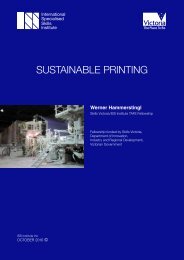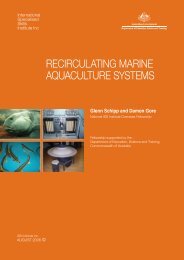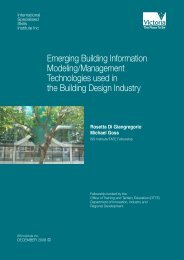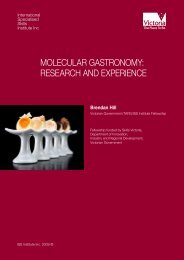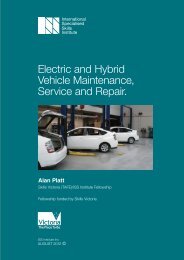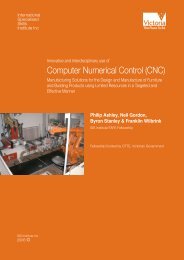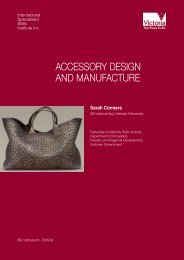Advanced design techniques and tools for the development of ...
Advanced design techniques and tools for the development of ...
Advanced design techniques and tools for the development of ...
Create successful ePaper yourself
Turn your PDF publications into a flip-book with our unique Google optimized e-Paper software.
RecommendationsAustralian <strong>and</strong> Victorian GovernmentCurrently, <strong>the</strong> Australian Government has allocated a large amount <strong>of</strong> grants in <strong>the</strong> areas <strong>of</strong> assistivetechnology <strong>and</strong> neuropros<strong>the</strong>tics in both Australian Research Council (ARC) <strong>and</strong> National Health<strong>and</strong> Medical Research Council (NHMRC) projects. The Government should allocate more funds toemerging researchers at universities <strong>and</strong> also encourage <strong>the</strong> <strong>development</strong> <strong>of</strong> more small to largeassistive technology industries in Australia.Apart from <strong>the</strong> funding <strong>for</strong> <strong>the</strong> research, <strong>the</strong>re is also need <strong>for</strong> funding in Assistive Technologyeducation. In Victoria few organisations such as Assistive Technology Learning (Yooralla), Centre <strong>for</strong>Developmental Disability Health <strong>and</strong> <strong>the</strong> Department <strong>of</strong> Human Services (State Government <strong>of</strong> Victoria)conduct this training. However, such training could be extended to wider communities through fur<strong>the</strong>rGovernment funding.Manufacturing Skills Australia (MSA)Manufacturing Skills Australia (MSA) is <strong>the</strong> national Industry Skills Council that is recognised by <strong>the</strong>Australian Government <strong>and</strong> <strong>the</strong> manufacturing industry to ensure that <strong>the</strong> skills needs <strong>of</strong> enterprisesare being met. MSA should take interest <strong>and</strong> provide industry intelligence <strong>and</strong> advice to SkillsAustralia in <strong>the</strong> area smart assistive technology. MSA should also actively support <strong>the</strong> <strong>development</strong>,implementation <strong>and</strong> continuous improvement <strong>of</strong> high quality training in smart assistive technology.Also, new project proposals could be submitted to MSA regarding <strong>the</strong> addressing <strong>of</strong> current limitationsin <strong>the</strong> area <strong>of</strong> smart assistive technology.Education <strong>and</strong> TrainingSmart assistive technology is an emerging research area. There exists Biomedical Engineeringcourses in RMIT, Monash University, Victoria University <strong>and</strong> <strong>the</strong> University <strong>of</strong> Melbourne in Victoria.However, specialised courses such as <strong>design</strong> <strong>and</strong> <strong>development</strong> <strong>of</strong> smart assistive technology <strong>and</strong>neuropros<strong>the</strong>tics courses are not fully taught/covered in Australian universities. Recently, <strong>the</strong> University<strong>of</strong> Melbourne has taken some initiative to introduce programs in brain research. Similarly, this yearRMIT has started a new Biomedical Engineering (BP275) program in which smart assistive technologytopics could be incorporated in engineering biomechanics <strong>and</strong> biomaterials <strong>and</strong> medical engineering<strong>and</strong> instrumentation courses. Introducing smart assistive technology or similar engineering studies insecondary schools as an elective topic will also encourage <strong>the</strong> next generation <strong>of</strong> students to showmore interest in technology. Also, both government <strong>and</strong> university funds should be available <strong>and</strong>utilised <strong>for</strong> <strong>development</strong> <strong>and</strong> commercialisation purposes. The funds should be targeted to enablesmall industry growth from <strong>the</strong> research carried out in <strong>the</strong> universities. This will in turn generate jobsdue to growth in biomedical industries <strong>and</strong> also create a self-sustainable smart assistive technologymarket in Australia.ISS Institute InvolvementISS Institute is an independent, national organisation, which works in association with Australiangovernments, industry <strong>and</strong> education institutions to permit individuals to benefit enriched skills <strong>and</strong>knowledge in conventional trades, pr<strong>of</strong>essions <strong>and</strong> cutting-edge technologies. ISS Institute can helpto improve <strong>the</strong> <strong>development</strong> <strong>of</strong> smart assistive technology in Australia by conducting <strong>the</strong> seminars/workshops with industry groups <strong>and</strong> experts in association with <strong>the</strong> Australian Government. Last year(2011) ISS Institute invited a leading pr<strong>of</strong>essor from MIT to deliver a special talk, which demonstrateshow expert knowledge could be shared with both researchers <strong>and</strong> industry groups. Similar invited talkscould be arranged from special experts from Australia <strong>and</strong> overseas in <strong>the</strong> smart assistive technologyarea.1819



